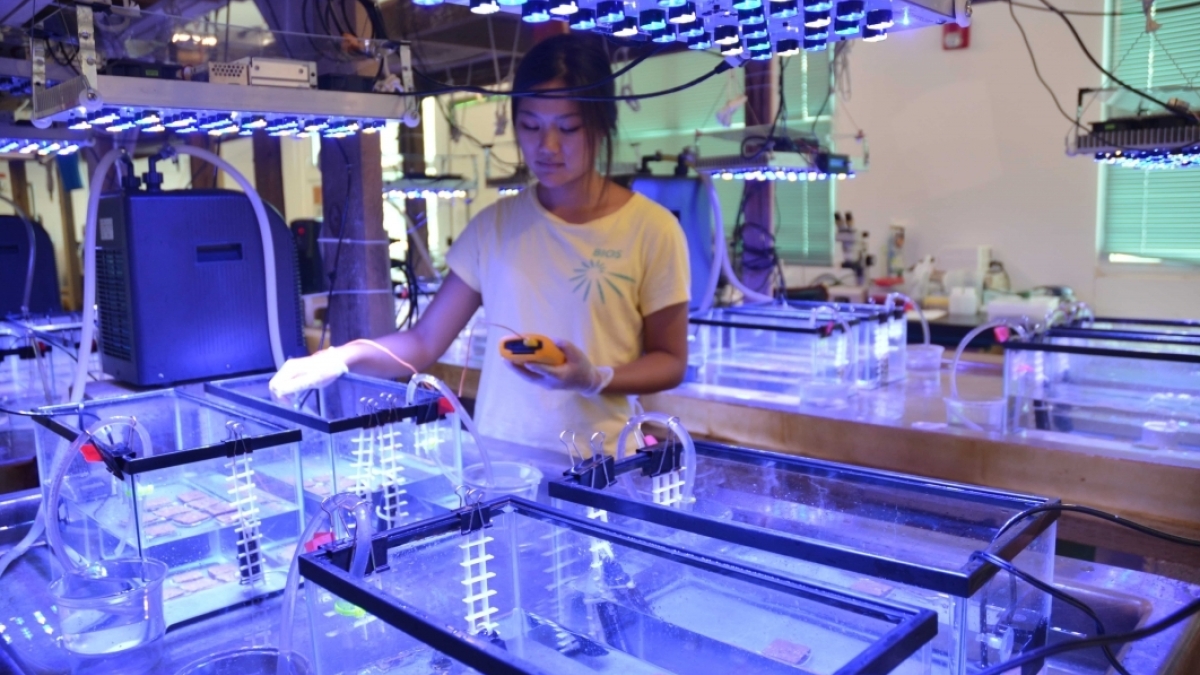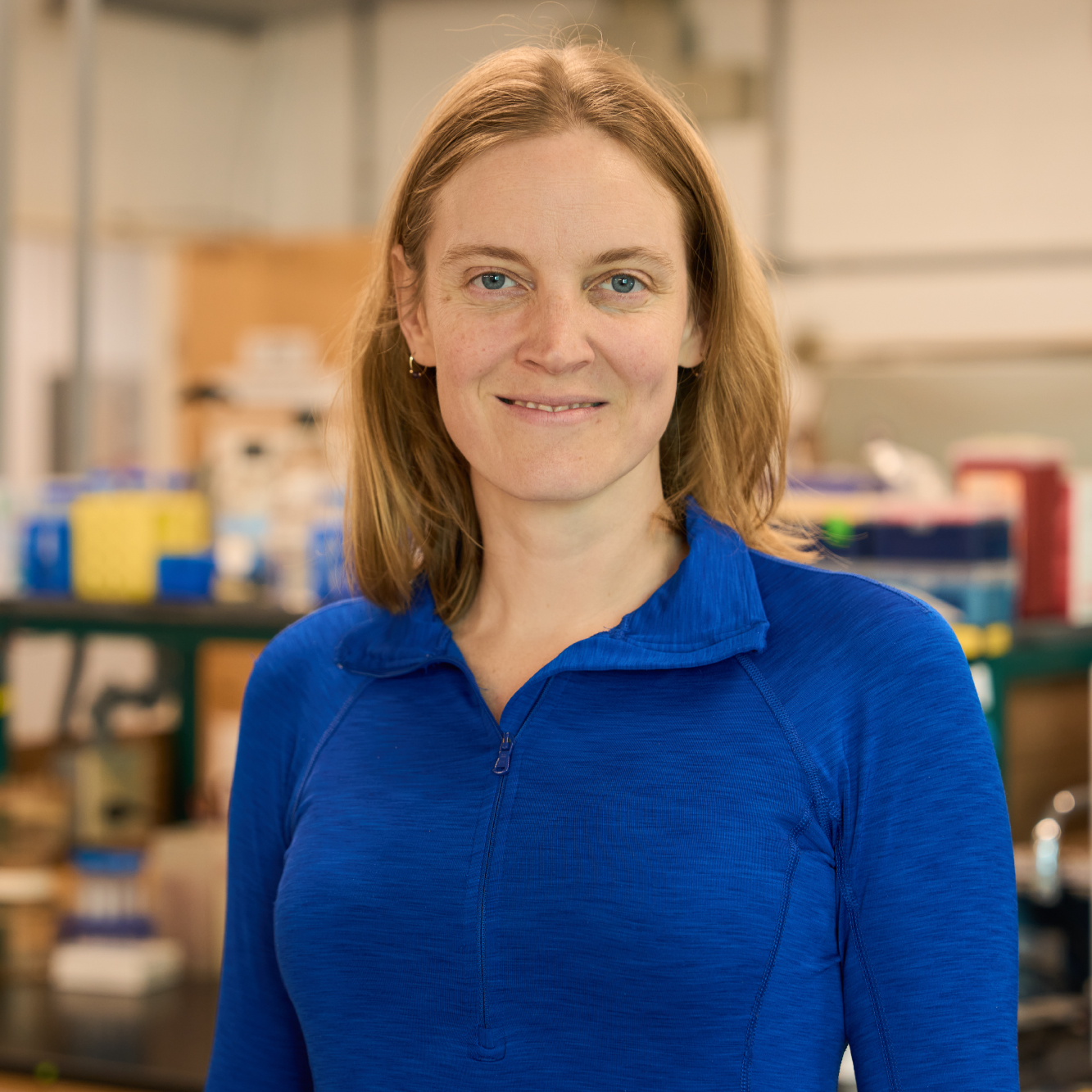Learn ‘forward-looking’ ocean science in School of Ocean Futures’ 1st course

The Bermuda Institute of Ocean Sciences is a unit of the Julie Ann Wrigley Global Futures Laboratory at ASU.
As human activity contributes to overfishing, pollution and changes in water temperatures and acidity levels, scientists at Arizona State University’s School of Ocean Futures are combining their efforts in Arizona, Hawai’i and Bermuda to address the threats facing our planet’s largest biome.
With the School of Ocean Future’s inaugural course, SEA 194: Ocean Futures, students can now prepare to join their efforts.
The course aims to equip future leaders and changemakers with the knowledge and tools needed to understand the intertwined relationship between ocean health and human outcomes. SEA 194 will begin in the fall semester, and a bachelor's degree from the School of Ocean Futures is currently under development.
The School of Ocean Futures is the newest school in the College of Global Futures, an educational unit of the Julie Ann Wrigley Global Futures Laboratory. This course will be taught remotely by Global Futures scientist Amy Maas, an assistant professor at ASU, while onsite at the Bermuda Institute of Ocean Sciences.
“It is exciting that Dr. Maas is going to teach this inaugural class offered by our new school; it will encapsulate the spirit of our new degrees that are in the planning stage, by teaching ocean science from a forward-looking and socially engaged perspective," said Susanne Neuer, ASU professor and founding director of the School of Ocean Futures.
“At the same time, the students will have the opportunity to build a community of like-minded students and get to know our faculty through guest lectures. Knowing Dr. Maas’ lively teaching style, I am sure this class will also be a lot of fun.”
Maas spoke with ASU News about what will be covered in the class, what makes it unique and the process of teaching from Bermuda.
Note: Answers have been edited for length and clarity.
Amy Maas, ASU assistant professor at the School of Ocean Futures and the Bermuda Institute of Ocean Sciences.
Question: What will students learn by taking this class?
Answer: Life on Earth relies on a complex interplay between the ecosystems on the land and in the water that are being profoundly impacted by human activities. Irrespective of where we live, human lives are intimately intertwined with ocean processes, which control heat and water patterns across the globe, annually conduct half of the oxygen producing photosynthesis on the planet, and serve as the source of animal protein for approximately 40% of the world. More than 80% of the world’s population lives within 50 miles of the coast, exposing them to ocean-based risks, as well as making the oceans vulnerable to high-density human activities. Oceans are changing in response to climate change and human activities: They are warming, acidifying and losing oxygen, and experiencing a biodiversity crisis.
The objective of the introductory Ocean Futures class is to introduce students to (the) present and futures of the oceans and the services that oceans provide to our planet. We will also examine the risks to these services associated with human activities (and) solutions to these problems, and help students figure out how their personal skills and interests can be channeled to promote a sustainable ocean within the Earth system. The class will be a mix of lectures, interviews, discussions and group activities with the goal of increasing student awareness of ocean science and promoting sustainability.
Q: Why is it important to understand oceans and our relationship with them?
A: Most scientists agree that we have a clear picture of the consequences of current environmental policies and behaviors. We need to learn to work as teams to engage the public, create new management practices, and invent new technologies that will ensure that the future planet supports vibrant, biodiverse and sustaining ocean ecosystems. As part of the Global Futures Laboratory and the College of Global Futures, the School of Ocean Futures is positioned in a group of thought leaders actively advancing our understanding of oceans, marine life, the management of marine resources, marine conservation, innovation, policy and economics.
Unlike other marine science and oceanographic programs, the School of Ocean Futures, starting with this first course, will train students in core scientific principles and practices of ocean science while also encouraging students to explore solutions to the most pressing issues facing our oceans today. Through projects offered in this course, students will gain knowledge of the “hard science” while also receiving the training to hone their skills in communication, collaboration and transdisciplinary solutions-oriented thinking. These skillsets are required to solve the pressing concerns of our times.
Q: How might the ocean futures course differ, if at all, from courses in oceanography or marine science?
A: A hurdle we want to tackle in this new program is the historic lack of inclusivity in ... who does this science as well as the lack of inclusivity in “typical” oceanographic and marine science culture. Statistically, Earth, atmospheric and ocean sciences lag far behind other fields in gender, ethnic and racial diversity (Bernard and Cooperdock, 2018). This has led to the exclusion and loss of various people from participating in these fields (Ackerman et al., 2023). Steps are being taken on national and institutional levels to address some of these issues, but geosciences require fundamental cultural changes to make the field welcoming and safe for all.
The new School of Ocean Futures is weaving diversity, inclusivity and cultural competency into its basic training of new scientists. My teaching assistant (TA), Andrea Brenner, and I were awarded an ASU Diversity, Equity and Inclusion (DEI) Training Fellowship to ensure that diversity and inclusivity are core to the design and construction of the course. Specifically, the course implements anti-racist practices, training in implicit bias and a growth mindset, providing content in formats supportive of neurodiverse students and actively including historically underrepresented perspectives in the course content. Traditional knowledge, place-based solutions thinking and diverse viewpoints are increasingly being recognized as important for creating equitable, just and lasting improvements in human/ecosystem interactions, and students in our courses will get explicit training in these topics.
Q: What are the advantages to you teaching this course from Bermuda?
A: SEA 194 will be taught as a hybrid course: both in-person on the Tempe campus and via Zoom. Although that is not new, what is different is that the instructor for this class is located at the Bermuda Institute of Ocean Sciences. The School of Ocean Futures is spread across three campuses — Hawai'i, Arizona and Bermuda — and instructors for all campuses will be teaching courses in all modalities, so we are really leaning into ASU’s innovative teaching technologies to facilitate new ways of engaging.
I am located in Bermuda and will be joining the class remotely in a Zoom-enabled room, but I plan on there being a ton of group work, discussion and engagement despite not being physically present, aided by TA Brenner. This added flexibility has benefits for nontraditional students and allows students to optimize their learning needs. Working with people across time zones and merging in-person and remote work is going to be increasingly important in our globalized world.
Q: How might ASU students get involved with the School of Ocean Futures and the Bermuda Institute of Ocean Sciences?
A: If students are interested in the new School of Ocean Futures, they can enroll in the introductory course that will be taught synchronously this fall and asynchronously this spring. Faculty from the school are spread across the three campuses, and there will be opportunities to engage in undergraduate research both in person and remotely. Other research opportunities will be possible through internships, summer and fall courses at the Bermuda Institute of Ocean Sciences. If students are interested in these, stay tuned for the application announcements, which will come out in the spring semester.
More Science and technology

ASU-led space telescope is ready to fly
The Star Planet Activity Research CubeSat, or SPARCS, a small space telescope that will monitor the flares and sunspot activity…

ASU at the heart of the state's revitalized microelectronics industry
A stronger local economy, more reliable technology, and a future where our computers and devices do the impossible: that’s the…

Breakthrough copper alloy achieves unprecedented high-temperature performance
A team of researchers from Arizona State University, the U.S. Army Research Laboratory, Lehigh University and Louisiana State…


